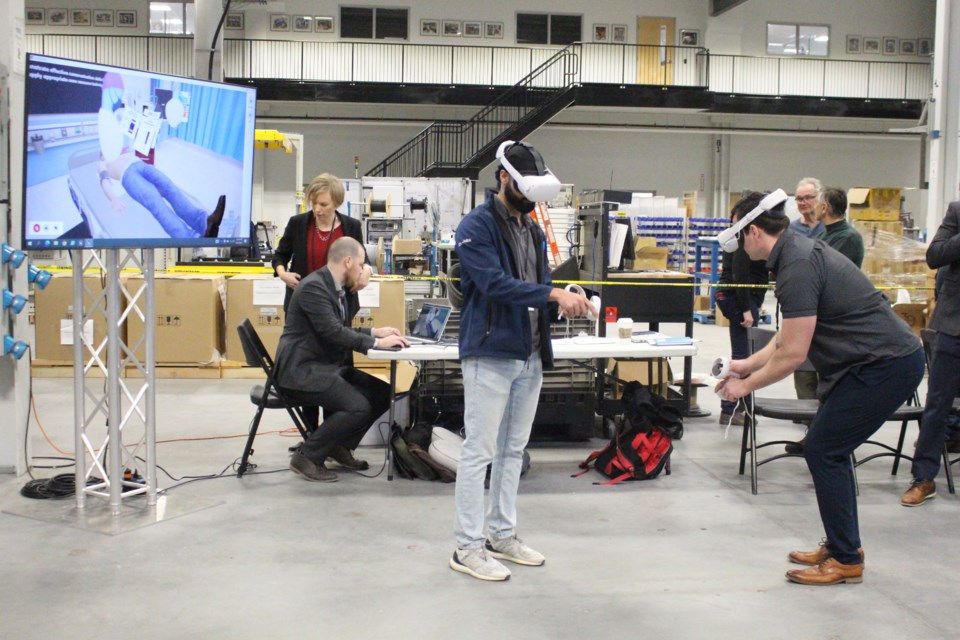It may look like a video game, but new technology at Royal Victoria Regional Health Centre (RVH) is really a high-tech educational tool that will help put the local hospital at the top of its field.
That technology was made possible following the announcement by Barrie-based manufacturing company Innovative Automation that they will be committing $1 million to the RVH Foundation’s Keep Life Wild campaign to support the advancement of immersive medical education at the Barrie hospital.
The money will be used to create the Innovative Automation Simulation Lab, a state-of-the art medical education centre focused on the integration of high-fidelity 'manikin' and virtual reality (VR) simulation technologies. It will also allow medical teams to practise their skills in hyper-realistic environments.
“It’s an important day for the health of our community, now and well into the future,” RVH Foundation CEO Pamela Ross said. “It’s a celebration of not only the generosity of this organization and its leaders, it’s also a celebration of innovation.”
Education and research is extremely important at RVH, president and chief executive officer Gail Hunt explained, noting this technology allows the organization to provide a much more realistic and complex educational tool.
“What’s particularly important about it now … is that with all of the health human resources challenges the industry has been experiencing (we are) finding the need to provide more education to staff in house than ever before, as well as to provide staff with the opportunity to address situations they may not see as often,” she said.
“Supportive innovative automation recognizes how much of an impact education has on staff and on patients. If you don’t get to practise this stuff before the real event occurs, it makes a big difference in the confidence and the outcome for patients," Hunt added.
Hunt, who has worked in the field for more than 20 years, said she has seen significant changes in how health care is provided over the course of her career.
“When I started about 24 years ago, just getting manikins was super exciting, and when we graduated to manikins you could program and run simulations, that was super exciting, but moving to this level … you can see the future where people will just be logging in at home and doing these things virtually that will really help spread education so much faster," she said.
This type of technology, Hunt added, can also help support physicians in rural and remote areas.
“They will have somebody to walk them through things. You can see the stages it will go through and exponentially how it will benefit patients all over the world," she said.
Innovative Automation founding partner and CEO Steve Loftus, along with president Mike Lalonde, admitted it only took them a few days to come to the decision to make the donation to help bring this tech to their local hospital.
“When the foundation reached out with this initiative, it aligned with what we are trying to do within our company (and) within our community,” Loftus said. “The decision didn’t take long after we had the right alignment.”
This initiative also aligns with two of the company’s pillars, he added.
“What RVH is trying to do here is what we are trying to do with our own employees, to have continuous education so that it allows them to offer a skill set that is beyond anybody else that is in their space," Loftus said. "Then they get to lead (their) industry the same way we do with our employees.”
The second pillar, he added, is to lead locally and help improve their community.
“This will enrich our community because it offers better service to everybody. When you get those kinds of alignments between what we are trying to do as a corporation and what we see at RVH, it’s an easy decision," Loftus said. "I literally did the demo, came back and we had a decision made the next morning. I gave them a call and shocked them.”
Officials say this investment will position RVH as a leader in immersive VR medical education. Simulations can be customized to match the health centre’s physical layouts and equipment configurations, as well as reproduce complex medical scenarios. It will also integrate team-based immersive experiences to train for major traumas and other highly specialized situations.
“Over the last year, we saw the potential for virtual reality to combine with our existing simulation program to really be innovative in how education is happening. This is going to be the future … and is the way it’s heading for many industries,” said Dr. Chris Martin, who serves as the hospital’s chief and medical director for critical care, director of education as well as co-medical director (trauma).
Martin says he's excited to see what the future holds for medicine, noting he has witnessed significant changes during the course of his career.
“I started my medical career just before a lot of the high-tech stuff. You can see the potential and how education has changed," he said. "It sounds scary, but when I was trained it was ‘see one, do one, teach one.' It was not a safe way to train, and medical simulation has offered us a safer way to practise in this high-risk environment as opposed to being on a patient with your senior physician one day.
“Seeing that, and seeing the possibility to not only train yourself and staff but (also) training as a team … any technology that enables that will make you a leader (because) it’s hard to do these big team simulations on site and this is going to facilitate that," Martin added.
“We are just on the cusp of a huge rise of this technology integrating into all aspects of health care, where we are little behind in incorporating this kind of stuff. It’s exciting to be on the leading edge amongst healthcare operations in the country."



